5 Movie Nitpicks (Everybody Can Shut Up About)
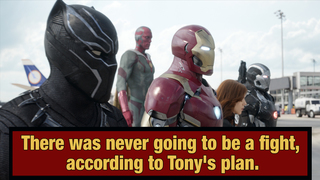
Some people say we've become too nitpicky about movies, and we get so obsessed with plot holes that we ignore theme, cinematography, performance, all that good stuff. These people are completely wrong. We have so much room to devote to movies that we can easily scrutinize the tiniest of plot details and also think about everything else. It leaves us no time for family or making a living, but some sacrifices must be made.
No, the problem isn't that people nitpick films. The problem is they nitpick them incorrectly. Like when they say ...
"What's The Point Of Anything In Harry Potter If They Can Go Back In Time And Undo It? Idiots!"
The Nitpick:
J.K. Rowling used to be popular, but she fell out of favor when it recently came to light that she wrote those awful Harry Potter books. Those stories made no sense! Azkaban introduced time travel in the form of little devices called time turners, and this should have removed all risk and drama because if something bad happens, you can just go back and fix it. That's what happens in some major superhero movies, that's what happens in crazy cartoons, and that's what logic says should happen in Harry Potter.
Whenever someone dies, why not go back in time and save them? Or go all the way back and save Harry's parents? Or do a fetus deletus on Voldemort back when he was still in the womb?
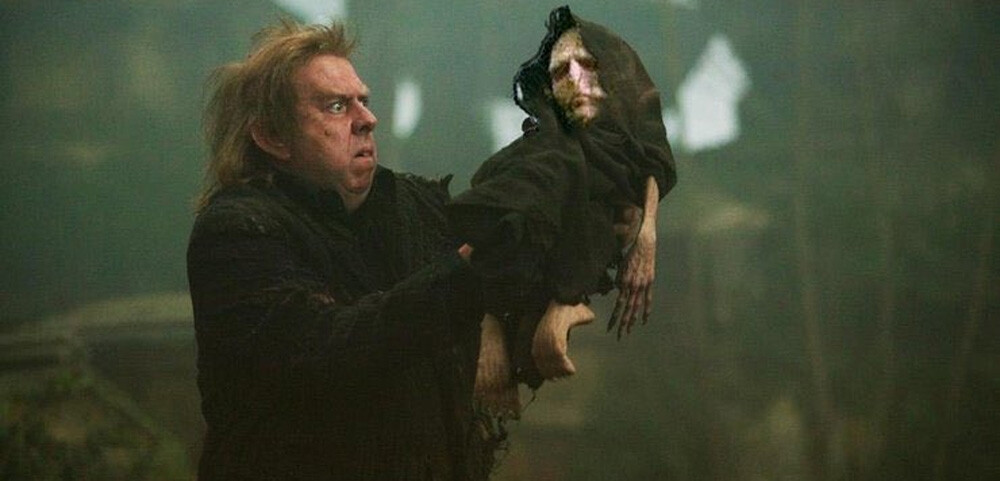
Warner Bros. Pictures
But Actually:
Time turners don't change the past.
Though there's an ungodly amount of fanfiction where time turners change the past—including the famous Potter play The Cursed Child, which is fanfiction because people other than J.K. Rowling wrote it—the books and movies show something different. Characters go back in time an hour or two (there's no indication you can go back further than that) and sometimes think they're supposed to change stuff, but they change nothing. They don't slip into an alternate timeline either. They go to their own past, where all actions are fixed. Their actions matter, but these are limited because we saw the results of those actions even before they traveled in time. They can make history, but they can't change history.
Harry sees a figure scare off the Dementors, then he goes back in time and scares the Dementors off, because that figure was him all along. The gang hear an axe fall and Hagrid cry, then they go back in time and save Buckbeak, which was what made the executioner drop that axe and made Hagrid cry for joy. The movie goes even further than the book, making some rocks hit the kids then having them go back in time and be the ones who threw those rocks.
I feel kind of silly recounting the plot as though you couldn't understand this story written for small children unless I explain it. But the fact is, many people who read the book or saw the movie came away thinking time turners change the past. They don't. Time turners just let you be in two places at once, which was why they routinely let Hermione attend simultaneous classes. They're great for productivity but aren't gamechangers when it comes to saving the world.

Warner Bros. Pictures
Rowling didn't invent this type of time travel. Stable time loops appear in a whole lot of stories, including the original Terminator, 12 Monkeys, and Lost. You can't change history in these stories. You'll have free will from your point of view when you go to the past, and yet your actions are set because they already happened even if you're yet to experience them. The actions you do in the past may even be essential to the plot, but you've already seen their consequences, and you won't change anything. Like all forms of time travel, this comes with its own issues ("if Beethoven goes back and hands himself his completed symphony, who actually wrote it?"), but characters' dumb refusal to act isn't one of them.
The books also tie off this plot thread by destroying all the time turners at one point, but that was never necessary. Even if the devices still existed later, characters wouldn't really have any application for them. A clone is cool but not that useful. Except for sex stuff. Yeah, wizards would use time turners for so many threesomes.
"Where Does Tony Stark Get Off Bringing A 15-Year-Old To A Death Brawl? Asshole!"
The Nitpick:
In Captain America: Civil War, a dozen superheroes battle. It's particularly risky for young Peter Parker, who doesn't understand half these guys' powers and doesn't even have a stake in this fight.
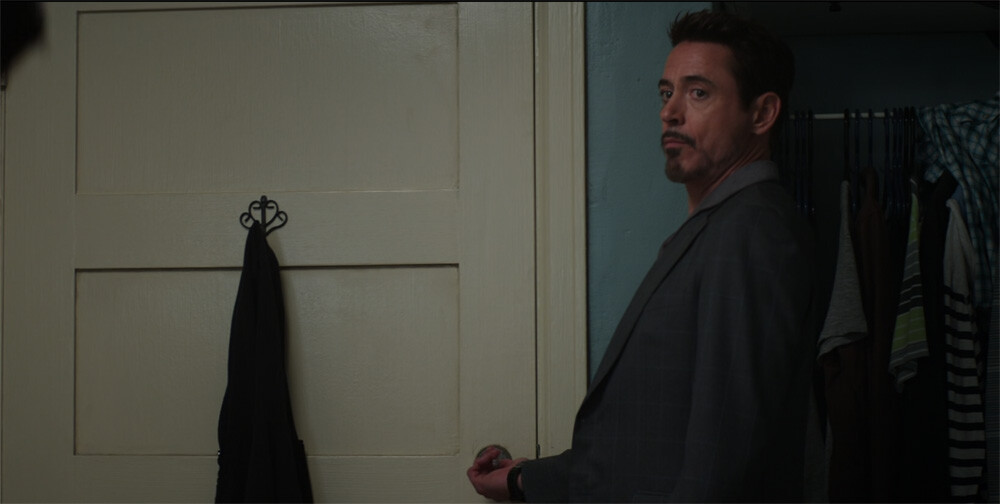
Walt Disney Pictures
What was wrong with Tony, bringing a child along? If he needed more backup so bad, why didn't he bring some more robots, or call in that bulletproof adult New Yorker who's been making headlines? Imagine if things went wrong and Peter died in front of Mr. Stark. That would have been heart-wrenching.
But Actually:
There was never going to be a fight, according to Tony's plan, and he was recruiting Peter to ensure that.
Tony wanted Steve and Bucky to give themselves up, not fight him. Though that sounds like a tall order, War Machine made them do exactly that a little earlier in the film, while also managing to apprehend Sam and Black Panther to boot. Of course, War Machine had a German SWAT team backing him up, and Tony wanted to do the same thing without bullets. So he needed one thing from Spider-Man, and it wasn't his fighting skills.
"You know what I think is really cool? This webbing," he tells Peter when they met. "That tensile strength is off the charts. Who manufactured that?" Then, at the airport, when Steve isn't willing to turn himself in, Spider-Man does the one thing he was asked to do: He webs Steve, incapacitating and disarming him. A little later, Tony reiterates the instructions that he must have given Peter before, though we're hearing them for the first time: "What we discussed. Keep your distance. Web 'em up."
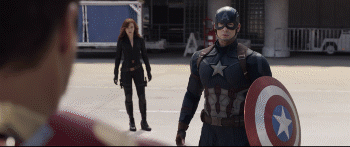
And this plan should have worked out just fine. Spidey would have webbed Bucky too. The pair would have been arrested ... again. Steve would have detailed all he'd learned about five new winter soldiers in Siberia, and the remaining Avengers would have gone to check that out (and discovered it was a red herring). End of story. But instead, out of nowhere, an arrow slices through the webs and ruins everything:
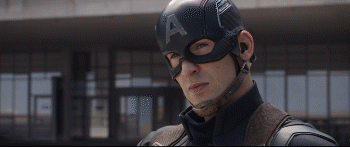
When the fight does start, I guess Tony could try even harder to make sure Peter gets out of there. But Spider-Man's really less at risk than almost anyone else. With spider powers come great durability. Natasha, Sam, Hawkeye, Ant-Man, Rhodey, Tony himself, even Wanda—all of them are more vulnerable to injury. Bringing in Spider-Man to prevent a fight from breaking out was the more responsible choice, rather than letting all these fragile but superstrong humans rip each other apart.
Immaturity doesn't mean Peter's in more physical danger. It has other consequences, of course, like that Peter absolutely shouldn't be gifted a pair of glasses that control a satellite assassination system ... yeah, never mind, Tony's judgment IS whack.
"Who Says The Cool Girl In The Breakfast Club Needed A Makeover? Misogynists!"
The Nitpick:
Molly Ringwald will forever be known as Archie's mom on Riverdale, but she also did some obscure, art house '80s movies, and she recently wrote about all the ways those appear problematic today. The most analyzed of those movies has to be The Breakfast Club, and one of the most common bits of Breakfast Club criticism concerns the makeover experienced by Ally Sheedy's character, Allison. She's the poster child for the "unnecessary makeover" trope.
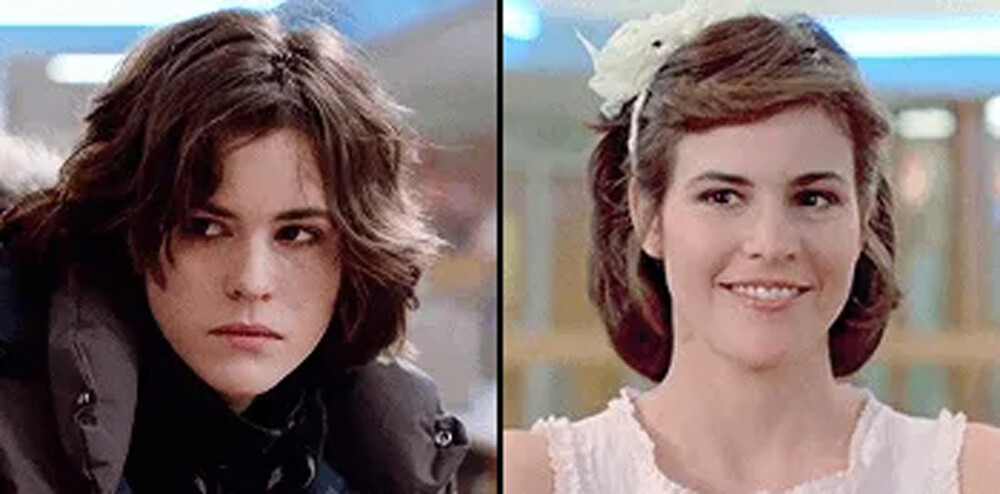
Universal Pictures
Allison is the "basket case" of the group, the weird outcast. Then toward the end of the film, she trades her black clothes for pink and puts on makeup and a bow. Suddenly, a jock wants her, and she's happy. Seems a terrible message in an otherwise inspirational movie for teens. Sacrifice your identity, get the boy, doll yourself up, that's what matters?
But Actually:
Some people who watch The Breakfast Club come away thinking, "The pressure on her to look pretty was bad." But every single person who watches The Breakfast Club—including all the people in the previous group, as well as everyone else—comes away thinking, "She looked better before the makeover!" That's notable.
Because Hollywood may not be good for much, but they're very good at putting attractive women onscreen. Even when we roll our eyes at one of their makeover movies because the "ugly" character is played by a clearly good-looking actress, you can bet the "after" character will look extra good because a team of stylists want her to. If she doesn't, the stylists didn't. Which means something's going on here besides the movie wanting us to cheer for how pretty she is.

Universal Pictures
Maybe we're not supposed to cheer for this change at all. Maybe this part of the film isn't supposed to be some idealization of what people can do but just a portrayal of people might do. When the kids make the nerd do their work or when they admit none of them will be friends the next day, those are just things that happen, not a message about what should happen. So is 80% of the characters randomly hooking up. Or maybe the movie has identified all these characters' personas as meaningless stereotypes instead of identities, so shedding one isn't a loss, and switching to another isn't a gain.
Or maybe it is a gain. Maybe this specific character's previous style was a front, and she always craved attention and interaction but never got it till now. Post-makeover, she finally gets that human contact and is happier, even if means she's less attractive to us. At that point, if we're angry because we personally like her old look better, then ... oh no. The misogynist was us all along.
"How Can Bruce Wayne Possibly Travel The World And Not Be Seen? Impossible!"
The Nitpick:
Bruce Wayne escapes from a prison pit in The Dark Knight Rises, and the next we see of him, he's in Gotham City. What, did he teleport? How did he get there so fast? The pit was somewhere on the other side of the world (the scene there was filmed in India). Plus, Gotham was physically cut off from even the rest of America by Bane's army. That was kind of the premise of this whole movie.
Bruce's travel habits get even more ridiculous later. He pops up in Italy, just hanging out, despite the world thinking he died in the purges. As if such a famous guy wouldn't be immediately recognized, no matter what new identity his "clean slate" program has given him. Clearly, this whole movie is just Robin's dying dream.
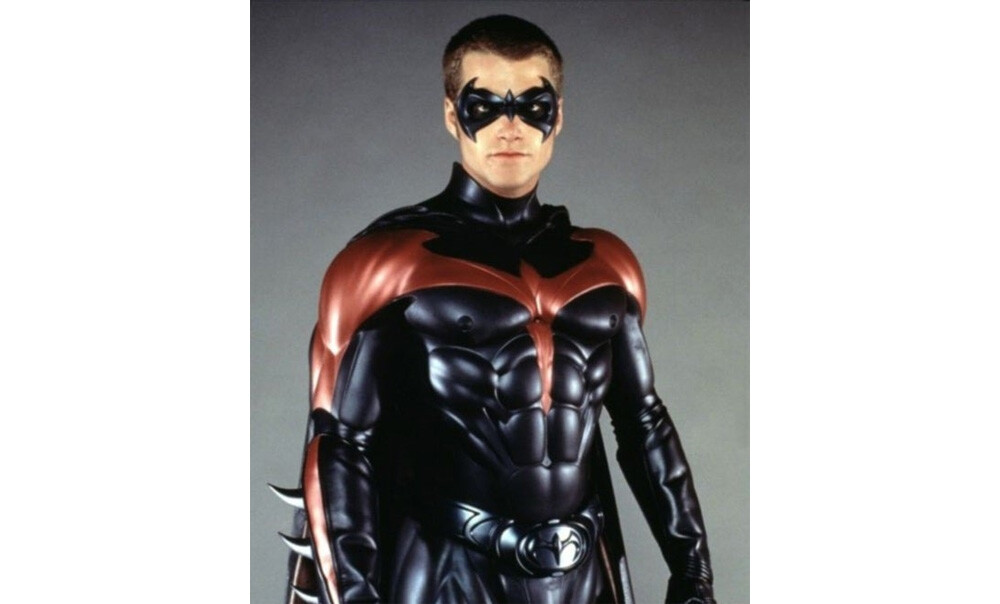
Warner Bros. Pictures
But Actually:
The Dark Knight Rises goes some way to addressing a handful of Batman fan talking points. Like the charged question of "why doesn't billionaire Bruce Wayne just fund social programs and stop crime before it starts"? Answer: He tries, but it's very expensive, even for him. A big city spends more every year than Bruce Wayne has in total, maybe ten times more, and even they struggle to fund everything. Or, why doesn't Bruce ever again use that sonic bat-summoner he brought out one time in Batman Begins? Answer: Because he's scared of bats, duh.
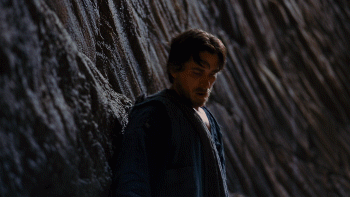
Now, about Batman hopping from one place to another. The film doesn't flash us with each day's date in giant white letters, so you have to listen to the people in Gotham counting down till the bomb goes off to figure out how much time is passing. Once you do that, you realize Bruce doesn't zip from the prison to Gotham in a few hours. It takes him three weeks.
That's a massive length of time. You could do the entire plot of The Dark Knight four or five times over in three weeks. Bruce could have a dozen ways of crossing the globe given that much time, everything from stowing away on a ship to actually getting a job so he could afford to buy passage legitimately. He was able to cross the whole world after ditching his money and documents even back at the start of Batman Begins, and that was before he'd gained a single Batman skill. The real question here might be why he took so long to return to his city—a question we'd have if the movie included three weeks' real-time footage of Gothamites freezing and starving.
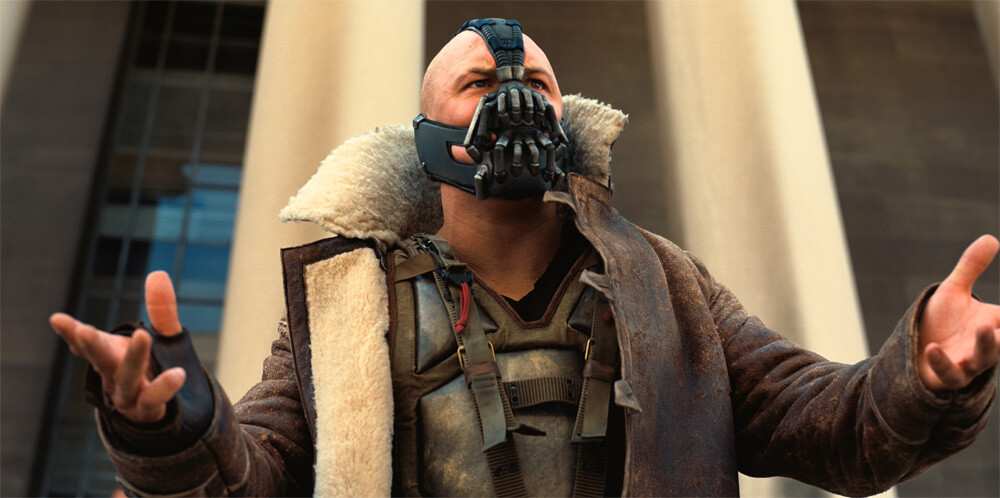
Warner Bros. Pictures
As for sneaking onto an island surrounded by ice, that ice was never impossible to walk over, just hard, which is why one mook with a heart of a gold advises an exile on how to cross safely then looks disappointed when he falls through. Learning to negotiate unreliable ice was the first lesson Batman ever received. This movie even gives us a quick flashback to the scene where Bruce warmed himself in front a fire after falling through ice while still training. In Batman Begins, the ice training just set up a recurring "mind your surroundings" gag, but for the real payoff, you had to wait till movie three.

And speaking of the first tricks he learned, along with traversing the globe, Begins also shows us young Bruce eluding notice for years while the whole world is actively searching for him. His retirement after the trilogy would be the same thing, except no one's searching for him because he's already been declared dead, and also, he now knows how to Batman.
But the real big clue from Batman Begins that you might easily miss comes at the end of that movie. A lot of us think of Bruce Wayne as some world-famous personality, based on something we heard about him in the comics maybe, or based on the fact that we have personally seen several movies with him in a lead role. Well, Begins is the height of his attempts to be a fake playboy and publicity hound, rather than the largely forgotten recluse he is at the end of his life, recognized only by professional society photographers. And this is how the newspaper reports Wayne Manor's destruction:
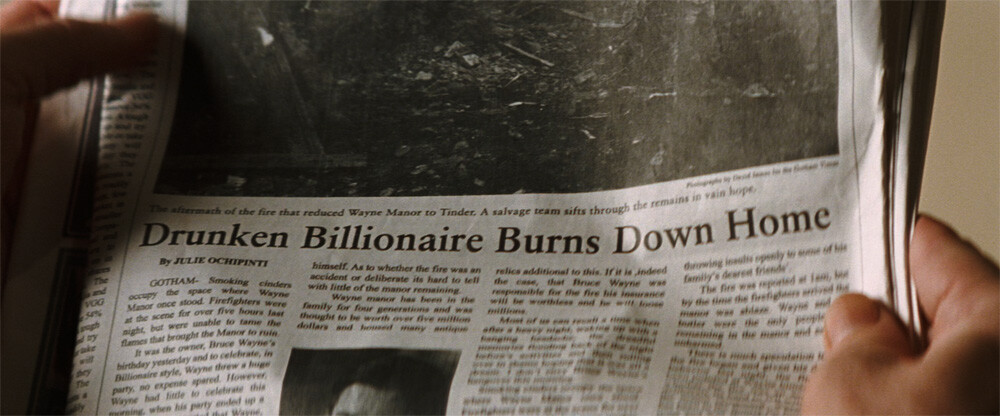
Warner Bros. Pictures
With Bruce at peak fame, his own city couldn't put his name in a headline and count on most readers recognizing it. And now you know just how unlikely it was that random folk in Florence would know the face of this late Gotham socialite.
"Why Did Sauron Make Destroying The One Ring So Damn Easy? Moron!"
The Nitpick:
Okay, we'll finally shut up about the Eagles taking the ring to Mordor—we concede that that would have been an apocalyptically bad idea. But when all was said and done, the Lord of the Rings gang didn't end up needing to fly there. When they finally simply walk into Mordor, there's a path laid out for them to get right to Mount Doom, complete with a wide open door so they can stroll right to the ring-smashing chamber. This is the one location where Sauron could be defeated. Would it have been so hard for him to seal the place up? Or at least throw up a door with a padlock on it?
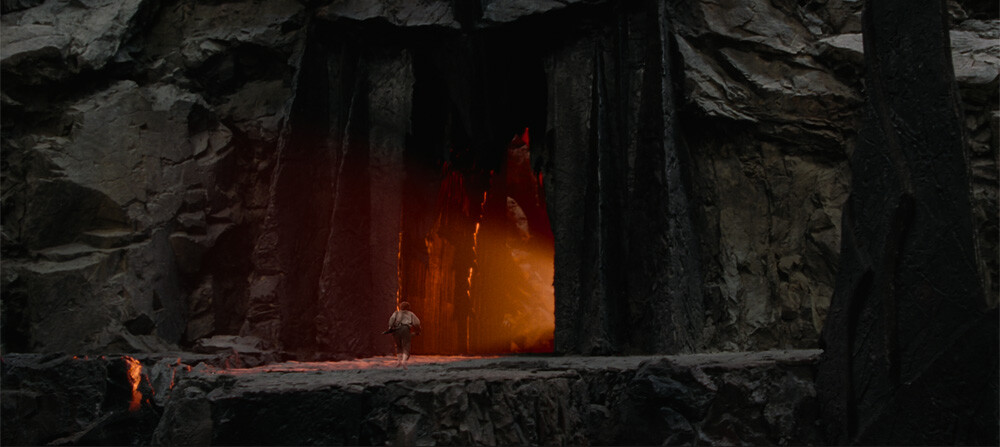
New Line Cinema
Also, that movie took forever to end. Jesus.
But Actually:
A Doom door would have been mostly irrelevant because reaching that doorway at all was basically impossible. To get there, the hobbits needed to learn a secret way into Mordor from a cave schizo who'd tracked them halfway across the earth, defeat a 7,000-year-old spider demigod using the elves' most beloved star, and then have all of Sauron's forces clear out because every able-bodied man in Gondor arrived at the front gate for a suicide mission despite having no idea if it would help Frodo at all.
And all those obstacles didn't really matter. With or without them, Sauron felt no need to block Mount Doom because he believed no one would ever enter it and destroy the ring. Ah, you might wonder, so this was another villain undone out of hubris, because he underestimated the good of others? No. Sauron was right. In the end, no one could cast it away. That was part of the magic of the ring.
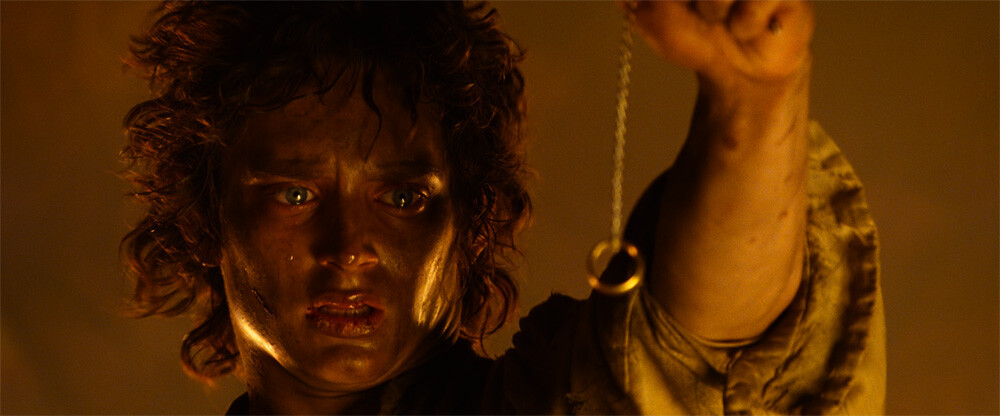
New Line Cinema
The ring fell into the lava by accident, because two different li'l guys who'd separately fallen under its sway entered the chamber at the same time and fought to the death right at the cliff's edge. The chain of circumstances that led to that happening was so convoluted and bizarre that it makes all the other unlikely events in the story seem inevitable. And because of that, though the heavens open up with triumphant music when the ring melts away, this isn't like the Death Star blowing up, where we get a simultaneous character victory. Frodo failed. Anyone would have.
And all of us suffered the consequences. Frodo didn't destroy the ring, and that was why the movie couldn't end. He lies down on the volcano rocks to die, but this isn't him sitting back, at peace. He is still sad about failing. Then everyone bows to him in Gondor, and Merry and Pippin seem to enjoy it, but Frodo's still sad. Sam gets married, Frodo smiles for a bit, but he's still sad. He finishes his book and is sad (it's his wound, he claims) and goes for a carriage ride and is still sad. Only when he gets on a boat does he smile, and only then is the influence of the ring finally defeated, because no one can be unhappy on a boat.
Follow Ryan Menezes on Twitter for other stuff no one should see.